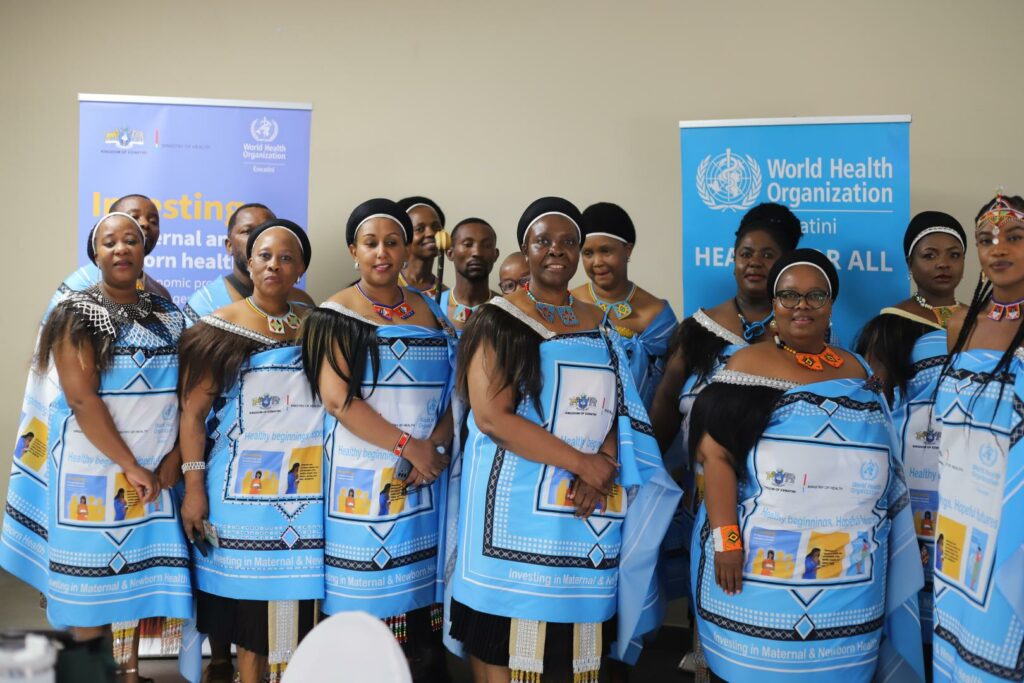Meanwhile, Eswatini’s neonatal mortality rate currently stands at 23 per 1 000 live births, slightly below the regional average of 27/1 000
In commemoration of the World Health Day 2025 on 7 April 2025, the Kingdom of Eswatini joined global partners in launching a year-long campaign under the theme “Healthy Beginnings, Hopeful Futures”, calling for renewed commitment to end preventable maternal and neonatal deaths.
The national commemoration brought together policymakers, health professionals, civil society, UN agencies, government officials, and children, reflecting a collective vision for safer pregnancies and healthier newborns.
In his keynote address, the Minister of Health, Hon. Mduduzi Matsebula, shared the country’s progress in reducing maternal mortality. Over the past decade, maternal deaths in the country have declined dramatically—from 593 deaths per 100,000 live births in 2012 to 240 per 100 000 live births in 2020, with a further decline in institutional maternal mortality from 140 to 75 per 100 000 live births in 2024.
About 99% of pregnant women attend at least one ANC visit. Statistics show that only 5% attend the recommended 8 ANC visits, and just 43% begin ANC in the first trimester, limiting opportunities for early detection of complications. Further, 93% of mothers deliver in health facilities attended by skilled health personnel. However, home deliveries still occur at 6% nationally.
Despite this progress, the rate of decline in maternal deaths has recently plateaued. Preventable causes such as postpartum hemorrhage (excessive bleeding) and pregnancy-induced hypertension (PIH) continue to drive maternal deaths.
“These gains are a testament to improved quality of care in our health facilities. However, the work is far from over,” said Minister Matsebula. “We must continue to scale up access to quality health care and ensure no woman dies while giving life.”
Meanwhile, Eswatini’s neonatal mortality rate currently stands at 23 per 1 000 live births, slightly below the regional average of 27/1 000. Most neonatal deaths occur during the first week of life, primarily due to prematurity (over 50%, birth asphyxia (18%) and malnutrition (16%), indicating the need for improved quality in antenatal and delivery services.
World Health Organization (WHO) Representative in Eswatini, Dr Susan Tembo, says these figures indicate that Eswatini continues to face significant challenges in reducing maternal and neonatal mortality. She reiterated that the focus of this campaign on mothers and babies highlights the urgent need for comprehensive improvements in maternal and neonatal care to effectively reduce mortality rates. “We must never forget that every maternal death is a tragedy, and the loss of every newborn life is a profound loss for our nation,” she said.
Encouragingly, the country’s investment in neonatal care has yielded results. The modern Neonatal Intensive Care Unit (NICU), established in 2019, has significantly reduced mortality rates among admitted newborns—even as referrals increase.
WHO’s call to Action
Dr. Tembo emphasized that maternal and neonatal deaths should be everyone’s business. “We must invest in maternal and newborn health—not just because it’s a moral imperative, but because it strengthens families, economies, and nations.”
WHO calls on all stakeholders—governments, donors, civil society, and communities—to:
1. Strengthen primary healthcare systems, especially around childbirth.
2. Expand access to skilled personnel, supplies, and infrastructure.
3. Prioritize emergency care, newborn support, and follow-up services.
4. Empower families and community health workers.
5. Accelerate efforts to meet SDG targets and end preventable deaths.







OTHER ARTICLES
Editorial — Prevent, inform, and act for women’s health in Africa
Kenya : Government Prioritises Maternal Health and Strengthens Support for Community Health Promoters
Strengthening pandemic prevention, preparedness, and response capacities in Senegal using the “One Health” approach